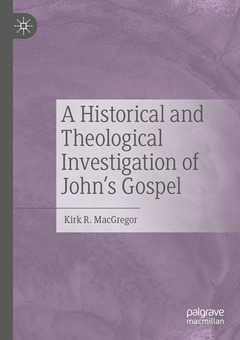A Historical and Theological Investigation of John's Gospel, 1st ed. 2020
Auteur : MacGregor Kirk R.

This book provides original and controversial contributions into specific areas of Johannine studies, along with defenses of various traditional theological interpretations of John that are commonly overlooked in New Testament scholarship. Kirk R. MacGregor offers new insights into the authorship of the Fourth Gospel, the content of the underlying Signs Source, the meaning of the phrases ?believe in him? and ?believe in his name,? Jesus? claim that Abraham saw his day, the significance of John 14.6, and why the resurrected Jesus upbraided Thomas. MacGregor employs the doctrine of middle knowledge to reconcile the seemingly paradoxical Johannine claims of divine predestination, genuine human freedom, and the universal divine salvific will. He defends the ontological equality but functional subordination of the Johannine Jesus to God the Father as well as the deity and personality of the Holy Spirit as presented by the Gospel of John.
1. Who Is the Author of the Gospel of John, and When Was It Written?
1.1 Internal Evidence for the Authorship of the Fourth Gospel
1.2 External Evidence for the Authorship of the Fourth Gospel
1.3 Prospects for Future Research
2. What is the Gospel’s Relationship to Previous Literary Sources?
2.1 Johannine Independence from the Synoptic Gospels
2.2 Source Criticism of the Fourth Gospel
2.3 Reconstruction of the Signs Source
2.4 Prospects for Future Research
3. What Is the Nature of Jesus’ Oneness with the Father?
3.1 The Background and Exegesis of John 1.13.2 The Significance of John 1.18
3.3 The Ontological Unity of Jesus and the Father in John 10.30
3.4 The Functional Subordination of Jesus to the Father
3.5 The Ontological Unity of the Disciples with One Another and Their Relational Unity with God
3.6 Prospects for Future Research
4. What Does It Mean to “Believe in Him”?
4.1 The Real Wedding at Cana
4.2 Making the Double Entendre Explicit
4.3 Consequences for the Johannine Conception of Faith
4.4 Prospects for Future Research
5. Does “Believing in His Name” Constitute Saving Faith?
5.1 The Insufficiency of Belief through Miracles?
5.2 The Meaning of Jesus’ Temple Actions
5.3 How Did the Crowds Interpret Jesus’ Demonstration?
5.4 Prospects for Future Research
6. How Do We Reconcile Divine Election and Human Freedom in John?
6.1 (1) God the Father chooses only some persons to be saved.
6.2 (2) Each person is able to freely choose between salvation and condemnation.
6.3 (3) God the Father desires all persons to be saved.
6.4 Applying the Doctrine of Middle Knowledge to the Johannine Teachings
6.5 Prospects for Future Research
7. According to John 8, Did Abraham in His Lifetime See Jesus?
7.1 The Claim of John 8.40 and Its Possible Biblical Allusions
7.2 The Claim of John 8.56 and Its Intertextual Significance
7.3 John 8.31-59 and Early Christian Reflections on Jesus
7.4 Prospects for Future Research
8. What Did Jesus Mean in John 14.6?
8.1 Grammatico-Historical Exegesis of John 14.6
8.2 The Historical Authenticity of John 14.6
8.3 Prospects for Future Research
9. What Is the Nature of the Holy Spirit?
9.1 The Divine Personality of the Spirit
9.2 The Character and Roles of the Spirit
9.3 The Functional Subordination of the Spirit
9.4 Prospects for Future Research
10. Why Did the Resurrected Jesus Upbraid Thomas?
10.1 Jesus and Thomas
10.2 Thomas’ Encounter with the Resurrected Jesus
10.3 Prospects for Future Research
11. Conclusion
Kirk R. MacGregor is Associate Professor of Philosophy and Religion as well as Department Chair at McPherson College in McPherson, Kansas. He is the author of numerous books including Contemporary Theology: An Introduction (2019) and Luis de Molina: The Life and Theology of the Founder of Middle Knowledge (2015).
Explores the perennial historical and theological questions raised by John’s Gospel.
Takes a unique, interdisciplinary approach.
Offers new contributions to the field Johannine studies.
Date de parution : 08-2021
Ouvrage de 230 p.
14.8x21 cm
Disponible chez l'éditeur (délai d'approvisionnement : 15 jours).
Prix indicatif 126,59 €
Ajouter au panierDate de parution : 08-2020
Ouvrage de 230 p.
14.8x21 cm
Disponible chez l'éditeur (délai d'approvisionnement : 15 jours).
Prix indicatif 126,59 €
Ajouter au panierThèmes d’A Historical and Theological Investigation of John's Gospel :
Mots-clés :
John 14:6; Believing in His Name; Gospel; Apostles; New Testament; Evangelical



